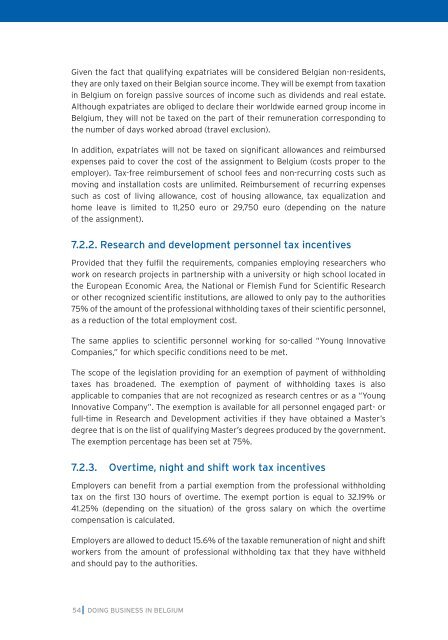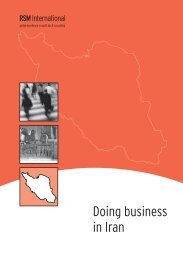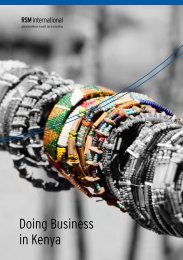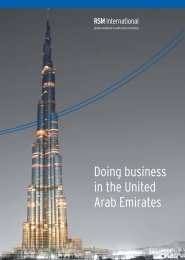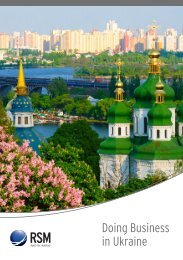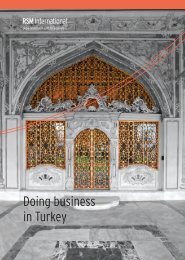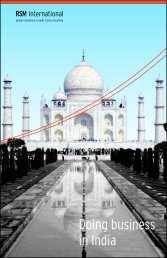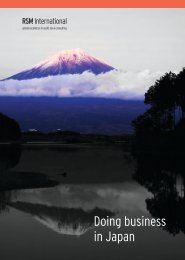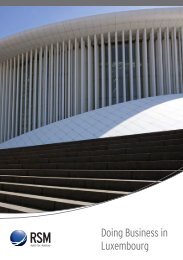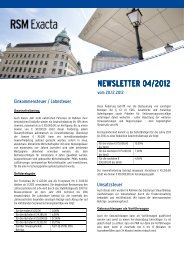Doing Business in Belgium - RSM International
Doing Business in Belgium - RSM International
Doing Business in Belgium - RSM International
You also want an ePaper? Increase the reach of your titles
YUMPU automatically turns print PDFs into web optimized ePapers that Google loves.
Given the fact that qualify<strong>in</strong>g expatriates will be considered Belgian non-residents,<br />
they are only taxed on their Belgian source <strong>in</strong>come. They will be exempt from taxation<br />
<strong>in</strong> <strong>Belgium</strong> on foreign passive sources of <strong>in</strong>come such as dividends and real estate.<br />
Although expatriates are obliged to declare their worldwide earned group <strong>in</strong>come <strong>in</strong><br />
<strong>Belgium</strong>, they will not be taxed on the part of their remuneration correspond<strong>in</strong>g to<br />
the number of days worked abroad (travel exclusion).<br />
In addition, expatriates will not be taxed on significant allowances and reimbursed<br />
expenses paid to cover the cost of the assignment to <strong>Belgium</strong> (costs proper to the<br />
employer). Tax-free reimbursement of school fees and non-recurr<strong>in</strong>g costs such as<br />
mov<strong>in</strong>g and <strong>in</strong>stallation costs are unlimited. Reimbursement of recurr<strong>in</strong>g expenses<br />
such as cost of liv<strong>in</strong>g allowance, cost of hous<strong>in</strong>g allowance, tax equalization and<br />
home leave is limited to 11,250 euro or 29,750 euro (depend<strong>in</strong>g on the nature<br />
of the assignment).<br />
7.2.2. Research and development personnel tax <strong>in</strong>centives<br />
Provided that they fulfil the requirements, companies employ<strong>in</strong>g researchers who<br />
work on research projects <strong>in</strong> partnership with a university or high school located <strong>in</strong><br />
the European Economic Area, the National or Flemish Fund for Scientific Research<br />
or other recognized scientific <strong>in</strong>stitutions, are allowed to only pay to the authorities<br />
75% of the amount of the professional withhold<strong>in</strong>g taxes of their scientific personnel,<br />
as a reduction of the total employment cost.<br />
The same applies to scientific personnel work<strong>in</strong>g for so-called “Young Innovative<br />
Companies,” for which specific conditions need to be met.<br />
The scope of the legislation provid<strong>in</strong>g for an exemption of payment of withhold<strong>in</strong>g<br />
taxes has broadened. The exemption of payment of withhold<strong>in</strong>g taxes is also<br />
applicable to companies that are not recognized as research centres or as a “Young<br />
Innovative Company”. The exemption is available for all personnel engaged part- or<br />
full-time <strong>in</strong> Research and Development activities if they have obta<strong>in</strong>ed a Master’s<br />
degree that is on the list of qualify<strong>in</strong>g Master’s degrees produced by the government.<br />
The exemption percentage has been set at 75%.<br />
7.2.3. Overtime, night and shift work tax <strong>in</strong>centives<br />
Employers can benefit from a partial exemption from the professional withhold<strong>in</strong>g<br />
tax on the first 130 hours of overtime. The exempt portion is equal to 32.19% or<br />
41.25% (depend<strong>in</strong>g on the situation) of the gross salary on which the overtime<br />
compensation is calculated.<br />
Employers are allowed to deduct 15.6% of the taxable remuneration of night and shift<br />
workers from the amount of professional withhold<strong>in</strong>g tax that they have withheld<br />
and should pay to the authorities.<br />
7.2.4. Notional Interest Deduction<br />
The notional <strong>in</strong>terest deduction applies with effect from tax year 2007 (account<strong>in</strong>g<br />
years end<strong>in</strong>g on December 31, 2006 or later). Under the notional <strong>in</strong>terest deduction,<br />
a company will be able to make a deduction from its taxable profits depend<strong>in</strong>g on the<br />
portion of equity f<strong>in</strong>anc<strong>in</strong>g. The regime is applicable to all Belgian companies and to<br />
Belgian establishments of foreign companies, whatever their size may be.<br />
The notional <strong>in</strong>terest deduction can also be considered as an alternative to the<br />
special tax regime for coord<strong>in</strong>ation centres end<strong>in</strong>g on December 31, 2010 (due to<br />
condemnation for “harmful tax regime” by the European Commission).<br />
The notional <strong>in</strong>terest deduction will be calculated by multiply<strong>in</strong>g the total equity by<br />
the <strong>in</strong>terest rate for 10-year government bonds (OLOs). The rate is 4.473% for tax<br />
year 2010 (3.80% for tax year 2011/2012). For small- and medium-sized companies<br />
(pursuant Art. 15 of the Company Law) the percentage is 4.973% for tax year 2010<br />
(4.30% for tax years 2011/2012).<br />
The law also <strong>in</strong>cludes measures to prevent abuse of the notional <strong>in</strong>terest deduction.<br />
To prevent the same equity from generat<strong>in</strong>g deductions for different taxpayers, the<br />
follow<strong>in</strong>g items are excluded from the base on which the deduction is calculated:<br />
1. The net book value of the shares the company holds <strong>in</strong> its own share capital;<br />
2. Sharehold<strong>in</strong>gs recorded as f<strong>in</strong>ancial fixed assets;<br />
3. Shares held <strong>in</strong> collective <strong>in</strong>vestment companies generat<strong>in</strong>g <strong>in</strong>come eligible for<br />
the dividends received deduction;<br />
4. The net book value of assets of permanent establishments held by the<br />
company <strong>in</strong> countries that have concluded a tax treaty with <strong>Belgium</strong>;<br />
5. The net book value of real estate (or entitlements <strong>in</strong> real estate) held by the<br />
company <strong>in</strong> countries that have concluded a tax treaty with <strong>Belgium</strong>;<br />
6. The net book value of fixed assets to the extent that the costs of these assets<br />
unreasonably exceed the needs of the company;<br />
7. The net book value of assets (e.g. art and jewels) that are not expected to<br />
generate regular <strong>in</strong>come;<br />
8. The pro rata net book value of real estate or other entitlements <strong>in</strong> real estate<br />
privately used or occupied by directors (or their spouse or children) receiv<strong>in</strong>g<br />
<strong>in</strong>come from the company hold<strong>in</strong>g the real estate rights;<br />
9. Recorded but unrealized capital ga<strong>in</strong>s, provided they do not relate to assets<br />
referred to <strong>in</strong> po<strong>in</strong>ts 4, 5, 6 and 7 above.<br />
54<br />
DOING BUSINESS IN BELGIUM<br />
DOING BUSINESS IN BELGIUM<br />
55


